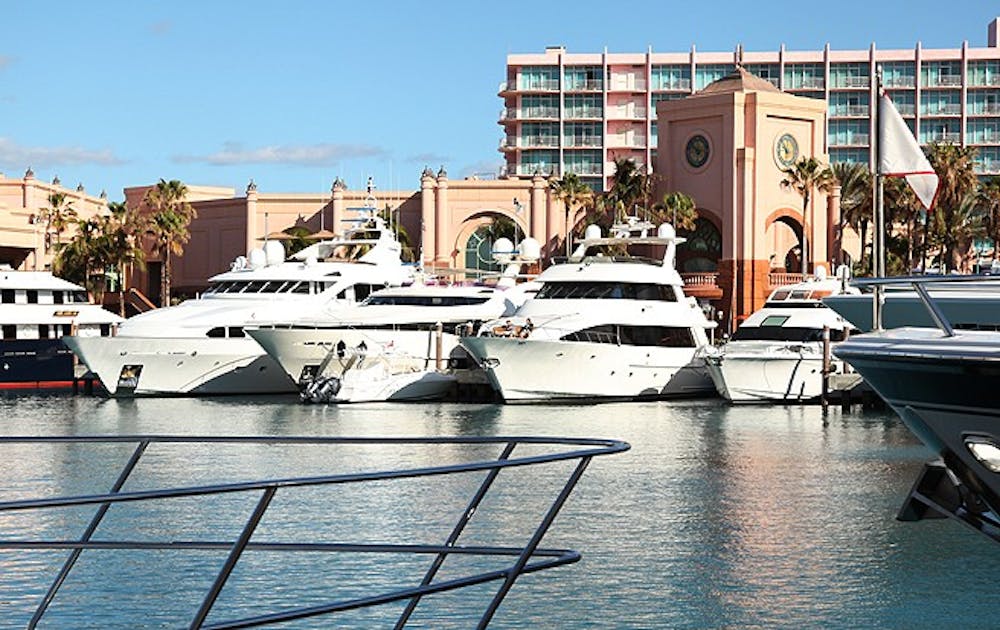This is part one of a two part series looking in-depth at the non-basketball aspects of Duke basketball’s trip to the Bahamas. Today’s examines the program’s decision to attend the early-season tournament in Nassau.
The density of the NCAA rulebook has become something of a punch line among athletic officials and sports fans alike in recent years, and one of the myriad regulations placed on college basketball teams limits them to 29-game regular-season schedules.
That limitation stands, except for so-called “exempt events,” which allow programs to participate in multi-team, multi-game early-season tournaments and count them as just one game. In the late 1990s, the NCAA tried to limit teams to two such events every four years, but a judge struck down the restriction in a lawsuit brought about by several organizers of such tournaments.
So, since December 2000, teams have been permitted to play in one exempt event each year, with the caveat that they can only play in a particular event once every four years. Duke has taken full advantage of these opportunities, participating in events like the Maui Invitational, the NIT Season Tip-Off and the CBE Classic. But this year, the Blue Devils opted to try a new event, the Battle 4 Atlantis at the Atlantis Paradise Island resort in the Bahamas.
“The exempt-event world is always twisting and turning, and [the scheduling] goes out many years,” said Mike Cragg, senior associate director of athletics. “We’ve got a pretty good cycle of ones we want to do every year, but things come up along the way. Things shift, and it ended up we had an opening relatively soon, and so we jumped at the chance.”
Cragg has handled these sorts of scheduling issues, in tandem with head coach Mike Krzyzewski, for nearly 20 years. He said it was about three years ago that he was first approached by the Battle 4 Atlantis organizers.
The Bahamian tournament is the brainchild of George Markantonis, who currently serves as president and managing director of Kerzner International Bahamas, the firm which operates Atlantis Paradise Island. The resort leadership was in search of a way to boost occupancy during the Thanksgiving period.
“People are off, kids are off from school,” said Paul Burke, chief operating officer of Kerzner International Bahamas. “It’s an opportunity for us to get people to come down and experience the resort. So what’s hot these days? What moves people?”
With the increasing popularity of competitive early-season tournaments and the long-standing success of the Maui Invitational, which has been held since 1984 in a resort setting similar to Atlantis, Markantonis’ answer to those questions was college basketball.
Burke said that Atlantis was particularly well-suited for such an event because of its “multi-generational” attraction, with activities such as a spa and golf for adults and a 141-acre water park for their children and grandchildren.
The Atlantis organizers then set about searching out programs with successful alumni bases with track records of traveling well.
Burke stated that Atlantis, located in the Bahamian capital of Nassau, lies within a two-hour flight of approximately 140 million people, and programs close to direct flights from the U.S. were especially attractive to fill out a potential tournament field.
As it turned out, the Atlantis leadership was not the first to conceive the idea of replicating the Maui setting closer to the Eastern seaboard.
“On one of the flights from Maui, Coach [Krzyzewski] and I were talking about how it’d be really good if there was an East Coast version of Maui,” Cragg said. “So I talked to a couple of promoters… and actually we had some people do some legwork into that. Long story short, it didn’t materialize.”
The long journey to Maui played a significant factor in Duke’s season last year, as the Blue Devils battled a six-hour time change coming back from Hawaii and proceeded to get blown out by Ohio State in their first game back.
The chance for an East Coast Maui-style tournament finally arose when Atlantis approached the Blue Devils about participating in a new tournament on Paradise Island. At that point, Atlantis had never hosted a basketball game, though they were used to putting on concerts and other spectator events.
In 2010, they invited four teams—Mississippi State, Virginia Tech, Georgia Tech and Richmond—to play a mid-December doubleheader as a dry run for the Imperial Arena, a 3,900-seat venue that Atlantis constructed in its 60,000-square-foot conference center.
The inaugural eight-team, three-day tournament was held last year, with then-No. 22 Florida State representing the ACC and then-No. 4 Connecticut as the other ranked team in the field. Both of those teams were upset in the semifinals, though, and Harvard defeated Central Florida for the tournament title.
The organizers learned a lot from their first time hosting such an event, and Cragg visited the facility to view its potential for himself. The organizers also offered a reported $2 million payout to each team that participated in the tournament.
“They’ve got a different rewards system, there’s no doubt about that,” Cragg said. “I told them a couple years ago, ‘I’m not sure you really need to do that, but we’re not going to turn it down.’”
The money goes directly into the athletic department’s fund which endows student-athlete scholarships,” Cragg said.
Correction: An earlier version of this article said that Central Florida won the 2011 Battle 4 Atlantis tournament, but, in fact, Harvard won it. The Chronicle regrets the error.
Get The Chronicle straight to your inbox
Signup for our weekly newsletter. Cancel at any time.

